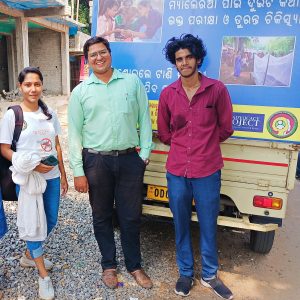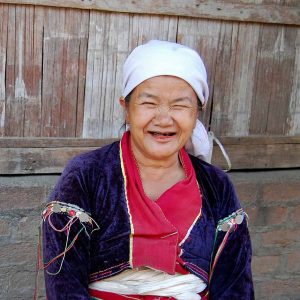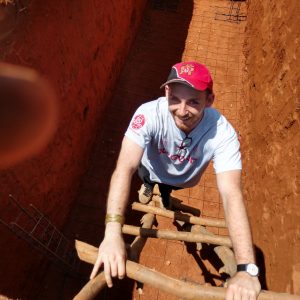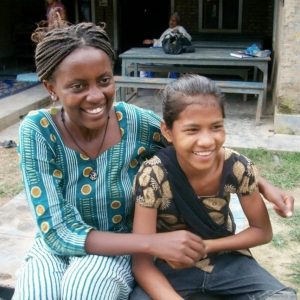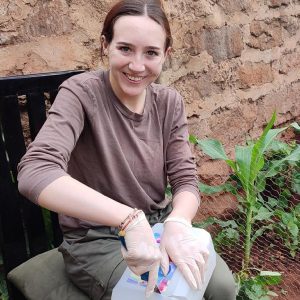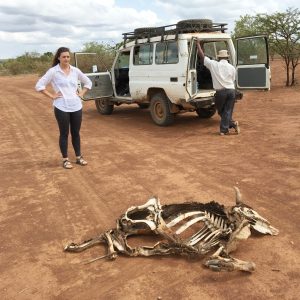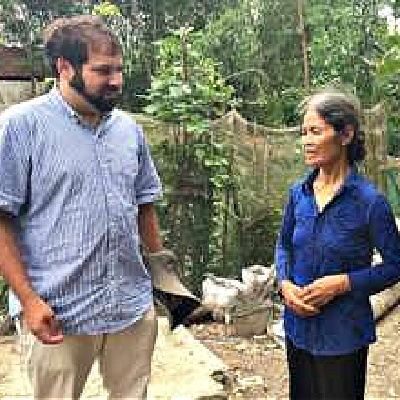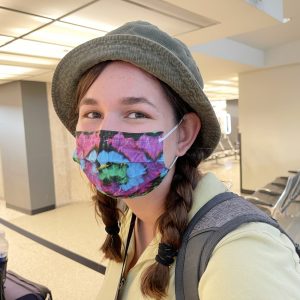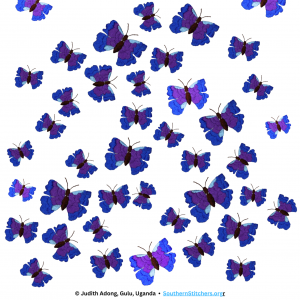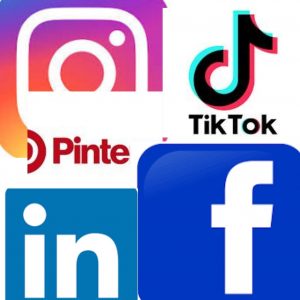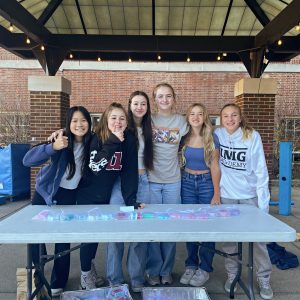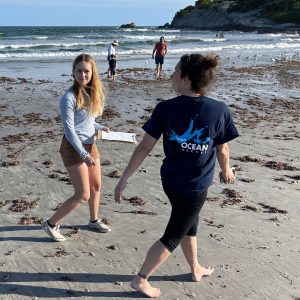Interested in volunteering for social justice and social change? If so, please consider applying for a 2024 summer peace fellowship. Read this page, contact us for an interview and apply by February 15. Early applications will be rewarded.
How to Apply
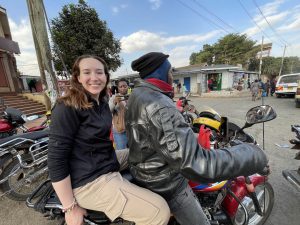
Caitlin Mittrick (George Washington University, 2023 Fellow) prepares to visit the settlement of Kibera in Nairobi with her host Stella Makena. Stella has launched a pioneering program to compost food waste in Kibera homes.
This page should be read in conjunction with our 2024 work plan. The openings on this page are likely to be updated, so please check in back regularly
Are you interested in a challenging summer working on the front lines for social justice and social change? If so, we hope you will consider a summer peace fellowship with The Advocacy Project (AP) in 2024.
Since 2003, we have deployed 334 graduate students to more than forty countries and hosted scores of undergraduate interns at our office in Washington DC. This year we are seeking graduate students to volunteer with partners in Nepal, India, Thailand, Vietnam, Uganda, and Kenya. Other fellowships may be added. We are also offering fellowships to undergraduates and high school students who will work from home or our office in Washington. The fellowships are listed on the next tab.
Summer fellowships will last for ten weeks between May 15 and August 31 and can be extended by mutual agreement.
To apply, send a cover letter by February 1st identifying two fellowships in the order of preference and explain your interest and qualifications. Add your resume and the names of two references. Email Iain Guest – iain@advocacynet.org. Call +1 202 422 2479 for further information. Early applications will be rewarded.
Eligibility
AP Fellowships are open to high school students, undergraduates and graduates. There are no restrictions based on nationality, gender, race, religion etc. All applications will be judged solely on their merits.
Stipends
Fellows deployed to the field will receive a lump sum of up to $2,000 in two installments. Remote Fellowships carry a monthly stipend of $200.
Responsibilities
Peace Fellows will play a vital role in helping us to support community-based partners in 2024. The responsibilities of each fellowship will be listed in a letter of engagement.
Qualifications
Personal: In selecting Fellows we look for work experience, knowledge of of the issue, language skills (if relevant), writing skills and a knowledge of social media. We also value personal qualities starting with an ability to adapt to difficult and unexpected circumstances; the power of friendship; enthusiasm; curiosity; and a commitment to communicate regularly. A big part of the Fellow’s job is to listen, advise and sympathize. We make every effort to accommodate special talents and encourage creativity.
Technical: We offer a range of services to partners that are described on this page and Peace Fellows can find themselves offering any of the following: a) Posting content on social media for the partner and AP (Tiktok, Facebook, Instagram, Pinterest, and LinkedIn); b) Using Google Drive; c) Taking, editing and posting photos (on Pikmonkey, Flickr and Google Drive); d) Profiling hosts and story-telling; e) Designing brochures, flyers, catalogues, and reports (Canva, Photoshop etc); f) Helping partners to post an appeal like this on GlobalGiving; g) Taking and editing video footage; f) Grant-writing and fundraising; g) Developing or maintaining a WordPress website. Please let us know your interests and level of skills in your application.
Blogs
All Fellows will be given a blog page on our website and required to produce one blog a week (Fellows in the field) and at least one blog a month (remote Fellows). Blogs are a key part of our fellowships. Not only do they describe the host organization’s work and help to guide our work and the work of the partner, they also provide the fellow with an important record of their fellowship. Past Fellows continue to draw on their blogs.
Work plan
We will develop an MOU setting out clear goals and a budget with each partner early in the year. Fellows will then use this to develop their personal work plan within the first week of arrival.
Evaluation
All Fellows will be asked to complete a brief questionnaire at the end of their fellowships.
Email and Drive: All Fellows will receive a personalized email account and access to our Drive for the duration of your fellowship.
Covering costs
The cost of a ten-week fellowship runs to around $5,500. We hope that university partners will provide financial support to returning Masters students. We will contribute up to $2,000 and work with Fellows to secure additional funding. Fellows are responsible for ensuring they are fully insured, vaccinated and secure the appropriate visas.
Evaluation
You will be asked to submit a comment on our website and fill out a questionnaire on completion of your fellowship. We will help with school evaluations requirements.
The application process
The deadline for applications is February 1. Early applications will be rewarded.
Contact Iain Guest at iain@advocacynet.org or DCOffice@advocacynet.org for more information and to schedule an interview. If you decide to apply, sent a letter, resume and the names of two references by no later than February 1 indicating your top two placements. Offers will be made by February 15 and all slots filled by no later than February 28.
On receipt of an offer, we will ask you to sign a contract and a waiver. We will also ask for a $125 deposit from Fellows being deployed abroad. This will be refunded before your departure.
Learning from past Fellows
Most of our 2024 partners have hosted Fellows in the past and they will be your best source of information about your own fellowship. If selected, we will put you in touch. In the meantime, we suggest that you consult their blogs here.
For more information email iain@advocacynet.org and read our Annual Reports
2024 Fellowships

